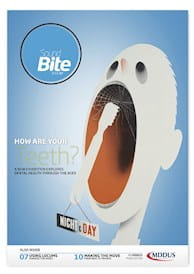DENTISTS who run their own practices will likely need locum staff to fill occasional service gaps, be it a dentist, dental nurse, dental hygienist or therapist. Taking the time to get things right can not only reduce your own stress levels but also your personal and practice liability if things go wrong.
Preparation is key to managing the risks.
Key checks
First, it is vital to ensure that the locum you contract with is who they say they are. Check the evidence of their identity, inclusion on the relevant professional register and NHS performers list (if they are a dentist), as well as written evidence of their own personal indemnity arrangements. They should also provide appropriate current evidence of vaccinations. A dental professional’s registration status can be checked, including any restrictions on their practice, on the GDC website.
You may also wish to obtain any relevant references and ask to see a copy of their enhanced disclosure report. Remember that dentists will already have had to provide this when applying to join the performers list.
It is advisable to check all of these details yourself even if you are using an agency as you may still be liable for any of the agency’s negligent acts/omissions.
Advance warning
Ideally your locum will be provided in advance with written information outlining their expected duties to avoid any confusion or problems on their first day. You may also wish to consider informing patients booking appointments that they will be seen by a locum. Patients should certainly be advised of the change of practitioner by the reception team when they arrive for their consultation.
Induction
You have a responsibility to ensure that the locum clinician is safely inducted into the practice. In advance of their arrival, it is important to have considered all the information and processes that are essential for them to safely undertake clinical care. This should include an orientation walk-around and introduction to the dental team. It is also a good idea to allocate a named clinician from whom the locum can seek assistance or advice. Ideally a record should be made of the completed induction. It is a mark of good leadership and indicates to inspectors that you take patient safety and staff training seriously.
Unique login
Locums should be provided with secure access to your clinical records system. A unique login and a time-limited password should be set allowing access to all electronic patient records. This ensures an audit trail of their actions is available should the future need arise. The use of generic login credentials and passwords are not advised and are unlikely to comply with data protection principles set out in the GDPR.
Protocols
Locums will need key contact information on systems, such as people and services available within the practice, as well as any onward referral protocols that are in place. Remember to provide instructions for use of any emergency equipment, and your sterilisation procedures should also be readily available.
You should highlight the practice procedure for registering complaints, near misses and other serious untoward incidents. This means that any issues experienced by the clinician can be reviewed and reflected upon and appropriate action can be taken by the practice. It is advisable to undertake a sample audit of the locum’s work to identify any potential issues or problems. Be sure to obtain and regularly update their contact details in the event of future complaints or claims. Whilst the practice will be obliged to deal with complaints, the individual locum must address any claims in which they are named.
Referrals
Practices will have a system in place for making urgent referrals concerning suspected cancer. Where the referral is made by a locum who then moves on, the practice must have a system to check the referral has been properly made, received and actioned.
The arrangements for urgent referrals to oral and maxillofacial or oral medicine clinics vary around the country. Some areas have an online referral system, others have a centralised fax number with a standard pro-forma. In other areas, the local units will respond to a telephone referral or a letter.
One risk for a locum is that they arrive in a new practice where they are unfamiliar with the idiosyncrasies of the local health networks. Problems can arise when they see a patient who needs an urgent referral, either with a suspicious lesion that might be cancer or a life-threatening head and neck swelling. In the latter case, a locum would know to refer to the local A&E department, however urgent access to oral and maxillofacial services (OMFS) might be delayed if the locum does not know at which hospital the on-call OMFS team is based.
A useful way of managing this whole process is to develop a generic information pack for all locums which should be regularly reviewed and updated.
Associate locums
Finally, if you are a dental principal and have an associate who is responsible for providing their own locum, make sure that they know to undertake the same checks and induction process. Alternatively, seek a written agreement with the associate that the practice will provide the pre-induction checks and the induction programme.
Alan Frame is a risk adviser at MDDUS
This page was correct at the time of publication. Any guidance is intended as general guidance for members only. If you are a member and need specific advice relating to your own circumstances, please contact one of our advisers.
Read more from this issue of Insight Primary

Save this article
Save this article to a list of favourite articles which members can access in their account.
Save to library
